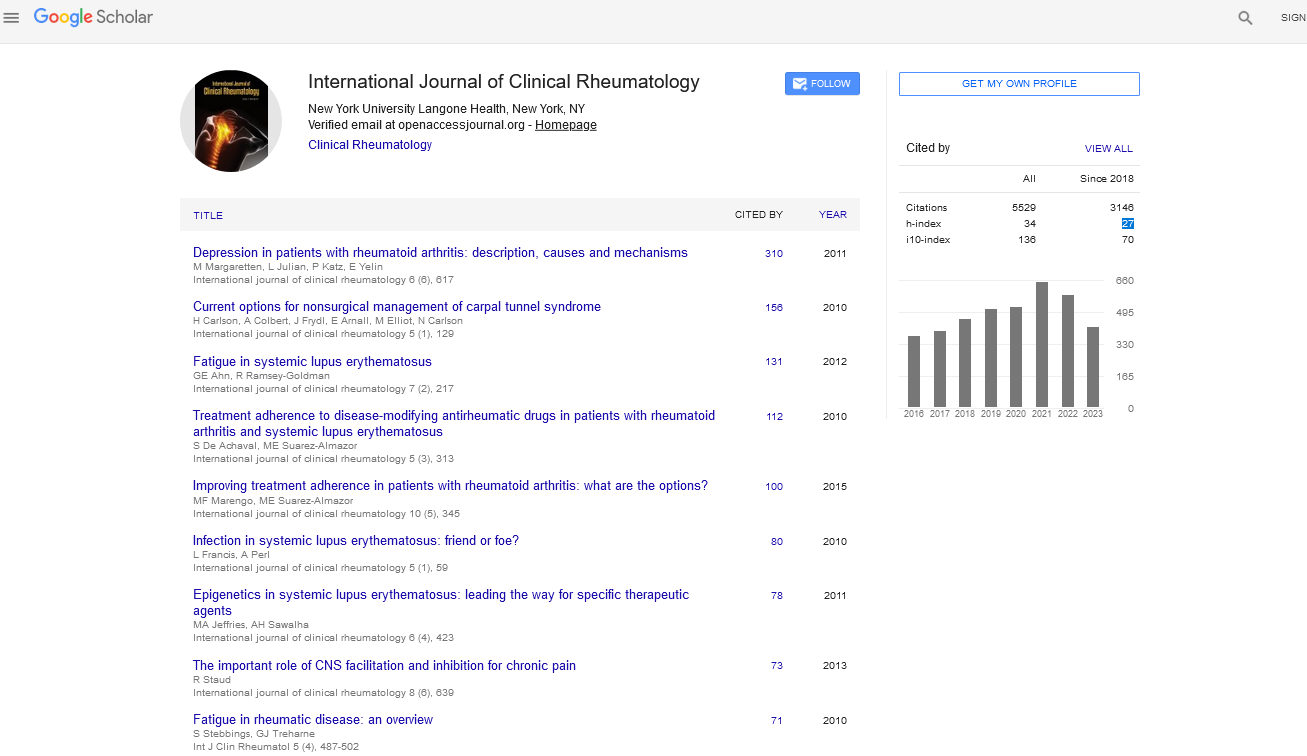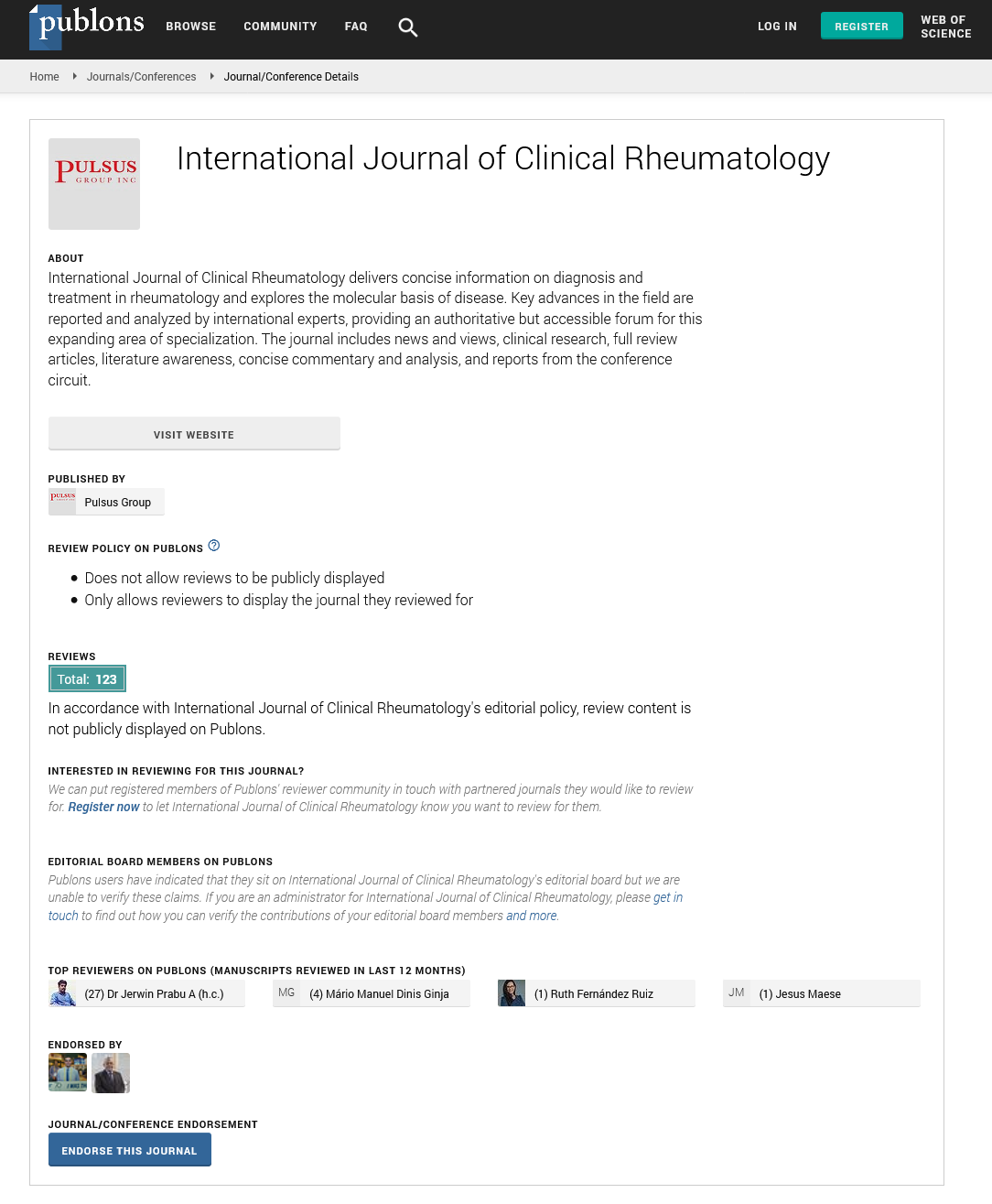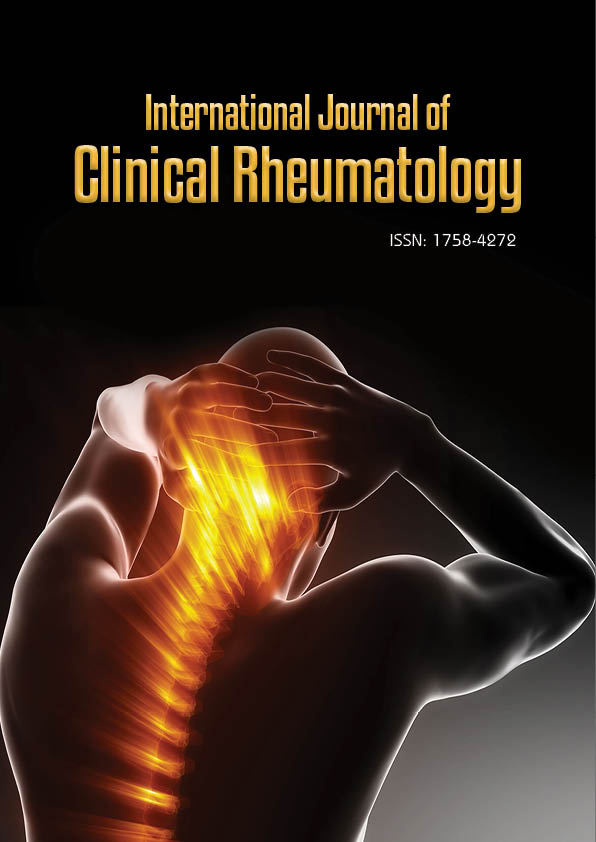Editorial - International Journal of Clinical Rheumatology (2024) Volume 19, Issue 9
The Role of Diet and Lifestyle in Managing Rheumatoid Arthritis
Afomia Vorsek *
Department of Neurology, Hawassa University, Haiti
- *Corresponding Author:
- Afomia Vorsek
Department of Neurology, Hawassa University, Haiti
E-mail: afomia56@yahoo.om
Received: 02-Sep-2024, Manuscript No. fmijcr-24-156571; Editor ssigned: 04-Sep-2024, Pre-QC No. fmijcr-24-156571 (PQ); Reviewed: 21-Oct-2024, QC No. fmijcr-24-156571; Revised: 23- Sep-2024, Manuscript No. fmijcr-24-156571 (R); Published: 30- Sep-2024, DOI: 10.37532/1758-4272.2024.19(9). 249-252
Abstract
Rheumatoid arthritis (RA) is a chronic, inflammatory autoimmune disorder that primarily affects the joints, leading to pain, stiffness, and potential joint damage. Traditionally, pharmacological treatments such as disease-modifying anti-rheumatic drugs (DMARDs) and biologics have been the cornerstone of RA management. However, there is a growing body of evidence that suggests diet and lifestyle modifications can play an important role in complementing medical treatments, improving disease outcomes, and enhancing the quality of life for patients. This article explores the impact of diet, physical activity, and psychological well-being on the management of RA, highlighting the importance of an integrated approach to treatment. It examines specific dietary patterns that may help reduce inflammation, the role of weight management, and the psychological and physical benefits of exercise. Additionally, the article addresses the challenges of integrating these non-pharmacological strategies into standard clinical care and the potential benefits they offer in terms of reducing dependency on medications, improving disease activity, and promoting overall well-being.
Keywords
Rheumatoid arthritisâ Dietâ Lifestyleâ Physical activityâ Inflammationâ Weight managementâ Mediterranean dietâ Psychological well-being
Introduction
Rheumatoid arthritis (RA) is a chronic, systemic autoimmune disease characterized by inflammation of the synovial joints, leading to pain, stiffness, and long-term damage if not appropriately managed. It affects millions of people worldwide, with a higher prevalence among women, and typically manifests in early adulthood. Traditionally, RA management has focused on pharmacological interventions, such as disease-modifying anti-rheumatic drugs (DMARDs), biologics, and corticosteroids, which aim to control inflammation, prevent joint damage, and alleviate symptoms. Despite the availability of effective medical treatments, there is increasing recognition of the importance of non-pharmacological interventions, particularly diet and lifestyle modifications, in managing RA [1-3]. These interventions are not only crucial in improving disease activity and quality of life but also offer a holistic approach to treatment. Increasing evidence suggests that dietary changes, regular physical activity, weight management, and mental health support can significantly complement conventional medical therapies, reduce inflammation, and enhance overall health. This article examines the role of diet and lifestyle in managing RA, with a focus on how these factors can influence disease activity, symptom control, and long-term outcomes. It explores the benefits of various dietary patterns, the importance of physical activity and weight management, and the impact of psychological well-being in patients with RA [4].
The Role of Diet in Managing Rheumatoid Arthritis
The mediterranean diet and anti-inflammatory foods: One of the most well-established dietary patterns that may benefit patients with RA is the Mediterranean diet. Rich in fruits, vegetables, whole grains, olive oil, nuts, and fish, the Mediterranean diet is known for its anti-inflammatory effects. It emphasizes the consumption of healthy fats (especially omega-3 fatty acids from fish like salmon, sardines, and mackerel), which have been shown to reduce the inflammatory response in the body. Omega-3 fatty acids are particularly beneficial in RA as they can help decrease the production of pro-inflammatory cytokines such as TNF-alpha and interleukin-6 (IL-6), both of which are involved in the pathogenesis of RA [5]. Research has demonstrated that adherence to the Mediterranean diet can reduce disease activity in RA patients, as well as improve overall functional status and quality of life. In a study published in the American Journal of Clinical Nutrition, patients who followed the Mediterranean diet showed decreased markers of inflammation, including reduced C-reactive protein (CRP) levels, a common biomarker for inflammation. Moreover, the antioxidants found in fruits and vegetables, such as vitamin C, vitamin E, and polyphenols, may help mitigate oxidative stress, which is implicated in the development and progression of autoimmune diseases like RA [6].
The role of Omega-3 fatty acids: Numerous studies have confirmed that omega-3 fatty acids, particularly those derived from fish oil, can have a significant anti-inflammatory effect in RA. Omega-3 fatty acids have been shown to reduce the production of inflammatory molecules like prostaglandins and leukotrienes, which are crucial in the inflammatory process of RA. The benefits of omega-3 supplementation have been widely recognized in clinical practice, with some studies showing that omega-3 fatty acids can reduce joint pain and stiffness, improve morning stiffness duration, and enhance overall physical function in RA patients. As such, increasing the intake of omega-3-rich foods, such as fatty fish, flaxseeds, and walnuts, may offer an adjunct to pharmacological therapies.
The impact of diet on gut health and inflammation: Emerging research suggests that the gut microbiome plays a crucial role in autoimmune diseases, including RA. Dysbiosis, an imbalance in the gut microbiota, has been linked to systemic inflammation and may contribute to the development of autoimmune conditions. As a result, dietary patterns that promote a healthy gut microbiome may help modulate immune function and reduce inflammation. High-fiber foods such as fruits, vegetables, whole grains, and legumes are known to promote the growth of beneficial gut bacteria, which in turn can help regulate the immune system. Additionally, fermented foods like yogurt, kefir, and sauerkraut contain probiotics, which may help restore balance to the gut microbiota and reduce inflammation. While research on the gut-Rheumatoid arthritis connection is still in its early stages, dietary strategies to support gut health are likely to become an important aspect of RA management in the future [7].
The Role of Physical Activity in Managing Rheumatoid Arthritis
The Importance of Exercise in RA Treatment: Regular physical activity is crucial for maintaining joint function and improving the quality of life in RA patients. Despite the potential for joint pain and stiffness, research consistently shows that exercise can significantly reduce RA symptoms, improve physical function, and prevent disability. Exercise helps maintain joint flexibility, build muscle strength, and prevent joint deformities caused by chronic inflammation. Low-impact aerobic exercises, such as walking, swimming, and cycling, are particularly beneficial for RA patients, as they minimize stress on the joints while improving cardiovascular fitness. Additionally, resistance training has been shown to improve muscle strength and protect joints from further damage. Yoga and tai chi are also gaining recognition as effective interventions for improving flexibility, balance, and overall well-being in RA patients [8].
The psychological and physical benefits of exercise: The benefits of exercise in RA are not limited to physical health alone. Regular physical activity can improve mental health, reduce symptoms of anxiety and depression, and help combat the fatigue that is often associated with RA. Depression and anxiety are common comorbidities in RA patients, and they can significantly impact a patient's quality of life and treatment adherence. Exercise has been shown to increase the release of endorphins, which help reduce pain and improve mood, making it an important aspect of the overall management of RA. Additionally, exercise can help with weight management, which is critical for RA patients, as obesity can exacerbate disease symptoms and increase the risk of comorbidities such as cardiovascular disease and diabetes [9].
The Role of Weight Management in Managing Rheumatoid Arthritis
Obesity as a Risk Factor in RA: Obesity is a significant risk factor for the development and progression of rheumatoid arthritis. Excess weight places additional stress on joints, particularly weight-bearing joints like the knees and hips, increasing the likelihood of joint damage and exacerbating pain and inflammation. Obesity is also associated with increased levels of systemic inflammation, which can further contribute to RA disease activity. Managing body weight through diet and exercise is crucial in reducing the burden of RA. Studies have shown that weight loss can improve joint function, reduce pain, and decrease the need for medication in RA patients. For example, a study published in Arthritis Care & Research found that obese RA patients who lost weight experienced significant improvements in disease activity, functional capacity, and physical health.
Caloric restriction and RA: There is some evidence suggesting that caloric restriction may reduce inflammation and improve disease outcomes in RA patients. While more research is needed, early studies suggest that reducing caloric intake could have a positive impact on RA symptoms by lowering levels of inflammatory cytokines. However, weight loss should be achieved in a controlled manner, as extreme dieting or malnutrition can lead to muscle loss and worsen joint problems [10].
Conclusion
While pharmacological treatments remain the cornerstone of rheumatoid arthritis management, diet and lifestyle changes play an increasingly important role in improving disease outcomes, reducing symptoms, and enhancing the overall quality of life for RA patients. The Mediterranean diet, omega-3 fatty acids, weight management, and regular physical activity can complement traditional treatments and help reduce inflammation, joint pain, and disability. Additionally, psychological well-being and social support are essential components of managing the disease holistically. As research continues to uncover the complex relationships between diet, lifestyle, and autoimmune diseases like RA, healthcare providers should consider incorporating these non-pharmacological strategies into patient care. By adopting a comprehensive approach to RA management, patients may experience better long-term outcomes, reduced reliance on medications, and an improved quality of life. However, addressing barriers such as access to resources, patient education, and individualized care is essential to ensuring the success of these lifestyle interventions.


